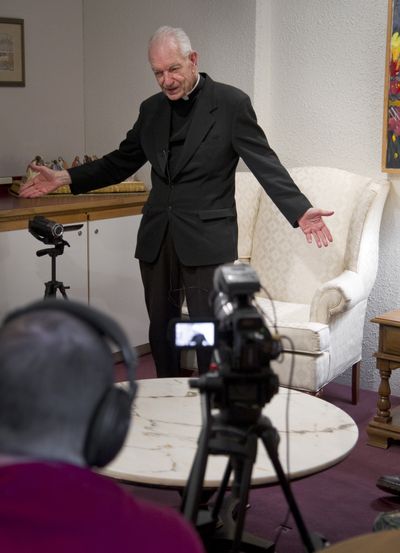Keeping memories
Ministry Institute preserving Jesuit priest’s legacy before Alzheimer’s disease takes his stories

The Rev. Armand Nigro, a Jesuit priest for more than 50 years, is losing his memories.
He’s open about it. Eloquent, in fact.
“When I was told that I was in dementia, and it was the Alzheimer’s kind, well gee, of all the diseases this is the one I would have feared the most, because you die before you die. And before you die, you’re a burden on everyone else,” Nigro, 83, says.
“But when they told me, I had a great peace. I knew something was haywire. When I’d forget things, I’d cuss at myself, ‘You dumb idiot!’ Now I know I can’t help it. It’s made me a little more compassionate to myself.”
Nigro is letting each day unfold. He’s always been fairly mellow, earning him the nickname “The Mister Rogers of the Jesuits,” after the gentle-spirited pastor who hosted the public television children’s show.
Nigro is calm, but others are eager to capture his wisdom before it’s too late.
Catherine Reimer, who met Nigro at Seattle University in the early 1960s, and her husband, John, will soon complete five hourlong video interviews with Nigro about his life and ministry.
They are also collecting written memories and photos of Nigro for The Ministry Institute, which Nigro cofounded in 1981 as Mater Dei, a seminary for men called to the priesthood later in life.
The institute, at 405 E. Sinto Ave. in Spokane, is now a center for spiritual renewal.
One recent Thursday, Nigro, who has led retreats throughout the world, sat down in a cozy conference room at Jesuit House on Gonzaga University’s campus. He remembered:
• His parents.
Nigro grew up in Spokane in the early 20th century among Italian immigrants who settled in neighborhoods near Gonzaga University and Hillyard.
When he was studying in Rome in 1963, his parents visited.
“I was never able to do anything for my parents,” Nigro said. “I entered (the seminary) when I was 17, and I couldn’t repay them for anything. We toured all through Italy and Sicily. We went to the village where my daddy came from. My grandmother brought him to Spokane when he was 5 years old.
“When he got to the village, he said, ‘Come with me.’ He took me down an alley right next to the place he was living when they left. And it was still there.”
• The happiest day of his life.
Nigro was ordained a Jesuit in 1956 at St. Aloysius Church. Nigro, who suffered with health problems in the seminary, said he had a premonition he would never live to be ordained.
Even at the altar, he thought: “I don’t know if I’m going to make it through this.”
He did. “I knelt down a layman and stood up a priest,” he said.
• His first retreat.
For decades, Nigro taught theology and philosophy, first at Seattle University and then at Gonzaga University. But his real calling was retreat work.
One day, during his priesthood training, Nigro’s superior called him in.
A fellow Jesuit was scheduled to give a retreat to nuns in Canada. The priest got sick. Nigro was told to step in.
“I said, ‘Father, I’ve never given a retreat.’ He said, ‘You’ll do all right.’ I gave the retreat. The (nuns) were very grateful, and after that, there’s never been a year I haven’t given an eight-day or 30-day retreat or weekend retreats.”
• Mother Teresa wasn’t a hugger.
Nigro led retreats for Mother Teresa and her sisters in India and Italy. When he first met her, “I was going to give her a hug,” Nigro said.
But she kept her hands in her sleeves and turned away.
Nigro said she was likely honoring India’s formal greeting customs, though Mother Teresa was infamous for her brusque manner. Later, she allowed Nigro to kiss her hand in greeting.
• He has regrets – sort of.
The Reimers were joined in the video session by former Seattle University students who knew Nigro in the 1960s when he was renowned for his five-minute sermons during the noon student Mass.
Rose Marie Doyle and Charlie Butler traveled from out of town just to be part of the interview process.
Doyle said: “From the get-go, I noticed you made use of every minute of every day. You carried around your assignment papers and corrected them in between all these other things.
“That was a marvelous example to me to see how you used your time. I think you lived two or three lives. Did you have a philosophy that geared you this way?”
Nigro responded: “The work, in a sense, became an addiction. You can just overdo some things. You can become addicted.”
Doyle said: “So now you look back with some regret?”
“In a way, but I wouldn’t have wanted to miss any of the students,” Nigro said. “I haven’t published books, but I have over 500 articles I wrote.”
Doyle said: “Father, we are your books.”
Nigro smiled at the compliment, a smile now captured forever on video.